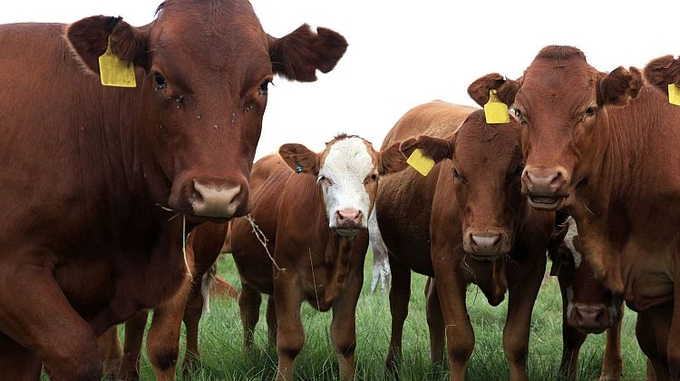May 19, 2025 | 09:56 GMT +7
May 19, 2025 | 09:56 GMT +7
Hotline: 0913.378.918
May 19, 2025 | 09:56 GMT +7
Hotline: 0913.378.918

Farming livestock produces huge quantities of greenhouse gases.
In January, the European Union approved the sale of these insects for human consumption in powder and other dried forms.
It's good news for the planet, as protein-rich insects require considerably less land and water than meat to produce.
“The consumption of insects … contributes positively to the environment and to health and livelihoods," an EU commission statement reads.
Here's everything you need to know to start cooking with critters.
Does eating insects help the environment?
It might be novel to many Europeans, but eating insects is actually very common - nearly 2 billion people consume bugs on a regular basis.
Farming insects is a lower carbon alternative than producing meat; cricket farming, for example, uses 75 per cent less CO2 than chicken farms.
It will also help to conserve resources. Research by the UN’s Food and Agriculture Organisation (FAO) shows that crickets require six times less feed than cattle to create the same amount of protein.
Will food containing insects be clearly labelled?
Despite the environmental benefits, not everyone is pleased with the EU's new insect approval.
In France, right-wing politician Laurent Duplomb slammed the EU’s decision saying: “We cannot let the French eat insects without their knowledge.”
This concern stems from the mistaken idea that the EU will not require insects to be clearly labelled when they are mixed with other ingredients such as flour.
This is not the case. The fine print requires that the cricket powder be clearly labelled.
The packaging must also state that the "ingredient may cause allergic reactions to consumers with known allergies to crustaceans, molluscs, and to dust mites."
This statement "shall appear in close proximity to the list of ingredients" - so you'll be able to tell if insect powder has been added to your favourite biscuits or cereal.
A European Commission spokesperson confirmed this via email to Euronews saying: "Mandatory food information must be available for both prepacked and non-prepacked foods. The indication of allergens is mandatory and must be provided to consumers where foods are offered for sale prepacked or without pre-packaging."
The approval isn't groundbreaking - the EU already approved two other insects for human consumption a few years ago.
Which European countries are most willing to eat insects?
But the thought of eating creepy crawlies is not everyone’s cup of tea and many in Europe would need a lot of convincing to add them to their diet.
According to a 2020 report by the European Consumer Organization, only 10 percent of Europeans are willing to swap meat for insects.
But in another poll conducted by YouGov in 2021, France seems to be the country that’s the most receptive to the idea.
Twenty five percent of the people surveyed said they’re willing to eat food which contains insect powder.
Germany and Denmark also narrowly suit with 24 and 22 percent respectively.
Italy and Poland were the most resistant to the idea with only 17 and 18 percent of respondents saying they’d be willing to try eating insects on a regular basis.
But with the issue of our planet’s growing population as well as the pollution caused by the meat and dairy industry, more and more scientists believe that insects could be the key to curbing climate change.
According to the UN, the meat and dairy industry accounts for 14.5% of global greenhouse gas emissions.
Eight more applications for other edible insects are still awaiting approval by the European Commission.
(ERN)

(VAN) Fourth most important food crop in peril as Latin America and Caribbean suffer from slow-onset climate disaster.

(VAN) Shifting market dynamics and the noise around new legislation has propelled Trouw Nutrition’s research around early life nutrition in poultry. Today, it continues to be a key area of research.

(VAN) India is concerned about its food security and the livelihoods of its farmers if more US food imports are allowed.

(VAN) FAO's Director-General emphasises the need to work together to transform agrifood systems.

(VAN) Europe is facing its worst outbreak of foot-and-mouth since the start of the century.

(VAN) The central authorities, in early April, released a 10-year plan for rural vitalization.

(VAN) Viterra marked a significant milestone in its carbon measurement program in Argentina, called Ígaris, reaching 1 million soybean hectares measured.